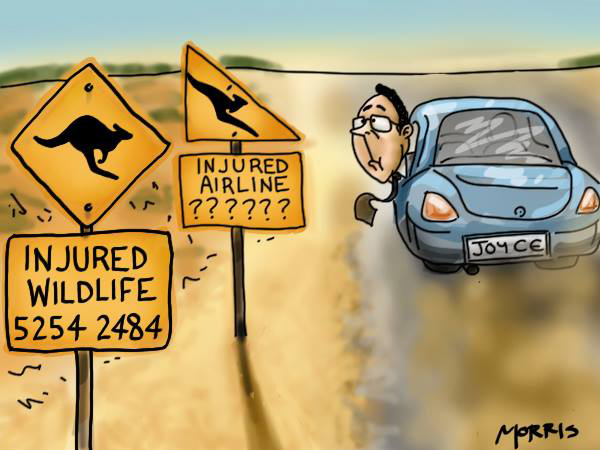His career at the helm of Australia’s national airline may be embroiled in uncertainty, but Qantas chief Alan Joyce was sure of one thing on February 27 – the airline’s current structure is “unsustainable” and “unacceptable”.
Following the announcement of a $252 million loss two weeks ago, there is a real risk Qantas could follow in the steps of Ansett Australia unless something is done to change its inefficient business structure.
The government has tried to intervene by legislating to remove foreign ownership restrictions, however doubt still surrounds whether the changes can actually solve Qantas’ problems.
This is because investors are attracted by a company’s ability to compete and make positive returns and currently Qantas is unable to do this effectively because of its high cost base.
Wages are a major cause of the problem with Qantas workers enjoying some of the most lucrative salary and rewards packages in the airline industry.
Once a proud reflection of the Red Roo’s commitment to quality and safety, labour costs cut into 24 per cent of the airline’s total revenue in the last year.
From this it is not difficult to see why the national carrier has struggled to compete with overseas competitors whose labour costs are much lower.
The Deputy Prime Minister and Infrastructure Minister Warren Truss has weighed in on the issue, telling Fairfax Media that the wage gap between Qantas employees and other airline staff is a serious concern.
“The Qantas wage and cost structure places them at a substantial disadvantage to the people they are flying alongside,” Mr Truss told the Sydney Morning Herald.
“Many of them are Asian…and Middle Eastern carriers where the wage structures are very much lower.”
The West Australian’s aviation editor Geoffrey Thomas echoed Mr Truss’s view during a Lateline segment on February 27 where he stated that the average Qantas worker makes $92,000 per annum as opposed to Emirates and Singapore Airlines where the average wage is between $42,000 and $47,000.
#Qantas killed by cheap ticket-seekers: “If you want the cheapest airfare you can’t employ Australians – Duh!” Dick Smith #Faine
— ABC Radio Melbourne (@774melbourne) February 27, 2014
In addition, $2.2 billion – or 28 per cent of total revenue – has been utilised covering fuel and maintenance costs in the last year.
This is five per cent higher than the 2012 fuel bill and is a legacy of both rising fuel costs and the carrier’s insistence on operating older, gas-guzzling planes such as the Boeing 747-400 or Boeing 767-300.
But with Qantas now bringing forward the retirement of its 767 and 747 fleets, the airline’s management also needs to take a serious look at the sustainability of its capacity war with Virgin Australia.
The two carriers disagree as to how much the market has been saturated, with Qantas accusing Virgin of adding 18 per cent more capacity with itself contributing only half that amount.
However, Virgin says Qantas’ aggressive desire to protect its 65 per cent share of the domestic market has seen it throw up to seven million seats into play as opposed to two million from Virgin.
Regardless of who has put out more seats, the prices of airfares have dropped significantly and this has forced a four per cent decline in revenue for Qantas.
The fact that the airline then has to try and sustain its premium services and high labour costs raises serious doubts as to how long it can continue operating in this way.
“The world’s most experienced airline” will need to call on its 93 year history if it wants to survive.
The moral of this story is that Qantas has to adapt to become a modern carrier if it is to survive.
With only 20 per cent of Australians still regularly using Qantas to fly in and out of Australia, the message could not be any clearer – Australians no longer want to pay to support Qantas in its current form.
The same message was sent to the Australian car manufacturing industry and not even $30 billion worth of government support could fend off the need for change.
After what he said two weeks ago, it will be interesting to see whether Alan Joyce has taken that same message on board.
Tom Colwell is a third year Bachelor of Law/Media student and Politics and Society co-editor for upstart. Follow him on Twitter: @TomColwell2








